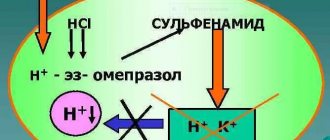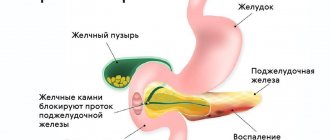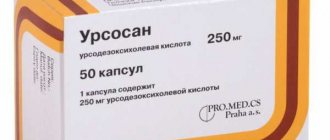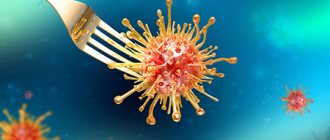Heartburn is an unpleasant symptom that you want to get rid of quickly. After all, eating and feeling full should bring pleasure and relaxation, not torment. Let's find out what medications can help with heartburn.
Heartburn occurs when acidic stomach contents enter the esophagus. The esophageal mucosa is not adapted to such an environment and an unpleasant burning sensation occurs. In the course of life, this condition can happen to anyone through overeating, bending over after eating, or in women during pregnancy. With prolonged symptoms, the esophagus may suffer, erosions, ulcers may develop, and scar tissue may form, which will lead to a narrowing of the lumen. Cell degeneration and the development of neoplasms may occur.
Causes of heartburn
The most common cause of heartburn is gastroesophageal reflux disease (GERD). It occurs in 83% of patients with this problem. In addition to heartburn, symptoms such as:
- regurgitation, esophageal vomiting, belching;
- salivation;
- pain when swallowing food;
- difficulty passing food;
- hoarseness of voice;
- nasal congestion;
- coughing;
- glossitis;
- interruptions in heart function.
In addition to gastroesophageal reflux disease, heartburn may be closely associated with:
- Peptic ulcer of the stomach and duodenum.
- Stomach cancer.
- Functional dyspepsia (a group of diseases that do not lead to changes in the structure of the digestive organs, but cause disturbances in their functions).
Many medications have the property of reducing the tone of the lower esophageal sphincter, which can lead to reflux of contents into the esophagus or themselves cause inflammation. Hormonal, antihypertensive, and anti-inflammatory drugs may have such side effects. Therefore, you need to read the instructions carefully.
Many medications can cause heartburn.
The cause of heartburn can be increased intra-abdominal pressure and conditions leading to this:
- pregnancy;
- ascites;
- flatulence;
- hepato-splenomegaly;
- constipation;
- chronic obstructive pulmonary disease, etc.
Without treating the underlying disease, taking heartburn medications will not only not help in the future, but will also mask the symptoms of the underlying problem.
Pain due to coronary heart disease can be confused with heartburn.
Side effects
Absorbable antacids have virtually no side effects, except for allergic reactions that occur in case of overdose. After stopping the medication or significantly reducing the dose, these reactions stop.
The undesirable effects of non-absorbable drugs are extensive:
- constipation at high doses;
- nausea and vomiting (rare);
- change in the taste of food;
- a significant increase in serum magnesium levels, which, combined with a lack of phosphorus from food, can lead to softening of the bones (osteomalacia).
Such effects occur only with prolonged uncontrolled use in high doses. If you follow the dosage indicated in the instructions or are under the supervision of a doctor, then side effects can be avoided.
Heartburn medications
If heartburn does not bother you often, once a week or less, you can take antacids and alginates .
Antacids
This group of drugs neutralizes hydrochloric acid produced by the cells of the gastric mucosa. Reducing acidity in the stomach helps to increase the tone of the lower esophageal sphincter.
Modern combination drugs that additionally have an enveloping and sometimes calming effect include:
- Phosphalugel;
- Almagel A;
- Gastal;
- Maalox;
- Relzer.
The main thing is that these medications do not have rebound syndrome, like regular soda. When using it, the acidity first decreases, and after a few hours it increases again.
Alginates
- Gaviscon;
- Gaviscon Double Action.
Preparations from the alginate group form a gel film on the surface, which protects the mucous membrane from the action of acid and pepsin. Some drugs have a double effect, since they contain an antacid component.
H2-histamine receptor blockers
- Ranitidine;
- Famotidine;
- Nizatidine.
They reduce the production of hydrochloric acid by the parietal cells of the stomach. The advantage of their action is that the secretion associated with food intake is suppressed to a lesser extent, which means the digestive processes will be affected to a lesser extent. At the first symptoms of heartburn, it is possible to take halved doses of H2-histamine receptor blockers. The effect can last up to 12 hours, and there is no need for additional antacid medications.
H2-histamine receptor blockers reduce the production of hydrochloric acid by the parietal cells of the stomach.
Proton pump inhibitors (PPIs)
- Nexium;
- Nolpaza;
- Pariet;
- Omez.
Proton pump inhibitors inhibit the final stage of hydrochloric acid formation in the parietal cells of the stomach. The maximum effect of administration develops on days 5-7 of administration. The secretion of hydrochloric acid is restored on the 2nd day after stopping the intake. With prolonged use of drugs for several years and a severe lack of hydrochloric acid in the stomach, pathogenic flora can develop. Drugs in this group do not have an immediate effect and can only be prescribed by a doctor after diagnosis.
Prokinetics
- Ganaton;
- Motilium;
- Motilak.
If the symptoms of heartburn go along with impaired motor function of the stomach, the organ is sensitive to stretching, prokinetics help accelerate the evacuation of food into the small intestine. The propulsive motility of the stomach increases.
UDCA preparations
- Ursosan.
Sometimes not only the contents of the stomach, but also the contents of the small intestine, such as bile, are thrown into the esophagus. This situation can arise in case of liver diseases, when drugs that reduce acidity in the stomach have already been used, there is no reflux of the acidic part, but there is irritation and heartburn in the esophagus. In this case, ursodeoxychoic acid (UDCA) preparations are recommended. They help the liver restore its function, normalize the formation and flow of bile, and can reduce the symptoms of heartburn. The course of application is from 2 weeks to 6 months.
Comparative characteristics of the main components
Most often, antacids contain Magnesium, Calcium and Aluminum salts. The table below shows the differences and features of their action, as well as a comparison with Bismuth preparations (for example, De-Nol).
| Effect /Salt | Magnesium | Calcium | Aluminum | Bismuth preparations |
| Neutralization of hydrochloric acid | Expressed | Moderate | Moderate | Absent |
| Adsorption of substances | Minor | Minor | Expressed | Minor |
| Enveloping the walls of the stomach | Absent | Absent | Minor | Absent |
| Astringent action | Absent | Absent | Minor | Expressed |
| Cytoprotection of the mucous membrane | Absent | Absent | Expressed | Minor |
Most modern drugs are a combination of various salts , which allows you to combine their strengths.
Preventing recurrent heartburn
There are some rules that can help reduce the symptoms of heartburn.
To prevent heartburn, you need to follow simple rules that will help reduce the load on the stomach and reduce unpleasant symptoms:
- Small portions of food 4-5 times a day.
- Reduce consumption of very spicy, salty, fatty foods.
- Avoid carbonated drinks and foods that cause gas (soda, beer, simple carbohydrates)
- Raise the pillow 15-20 cm while sleeping.
- Try not to eat before bed and not to lie down after eating.
- Give up bad habits (alcohol, smoking).
- Reduce excess weight.
- Do not lean forward too much and do not strain, avoid lifting weights of more than 8-10 kg (do not strain your abdominal muscles).
- Remove corsets and tight belts from your wardrobe, wear looser clothes that do not squeeze your stomach.
List of the most popular antacid medications
Here we will look at a list of the most effective antacids.
| Place in the ranking | First | Second | Third | Fourth |
| Name | "Almagel" | "Phosphalugel" | "Maalox" | "Renny" |
| Active ingredients | Magnesium hydroxide, aluminum hydroxide | Aluminum phosphate | Magnesium hydroxide, Aluminum hydroxide | Calcium carbonate, Magnesium carbonate. Without aluminum salts. |
| Release form | Emulsion in sachets or bottles | Gel in bags | Suspension in bottles, sachets, tablets | Pills |
| Start time | 3-5 minutes | 15-30 minutes | 9 minutes | 1.5 minutes |
| Validity | 60 minutes (on an empty stomach) – 3 hours (after meals) | 2-4 hours | 1.5-3 hours | 30-90 minutes |
| Side effects | · allergies; · constipation; · vomit; · stomach spasm. | · abdominal pain; · constipation; · diarrhea; · Alzheimer's disease. | · dyspeptic disorders; · allergies. | · “acid rebound” syndrome; · allergies; · electrolyte disturbances. |
| Advantages | Long lasting effect, low cost | Long lasting effect | Long lasting effect | Fast onset of action, low cost |
| Flaws | Average cost, side effects | average cost | Short duration of action, side effects |
The table presents a rating of the best modern antacids. After analyzing them, it becomes obvious that the leader of the rating is Almagel . This is due to its low cost, rapid onset and good duration of action . The frequency of side effects while taking the drug remains low.
There are also special forms of “Almagel A” containing benzocaine, which relieves pain, and “Almagel Neo” with simethicone for flatulence .
Conclusion
Self-medication can be practiced for mild, rare symptoms. For this purpose, drugs from the group of antacids and alginates are used, and a single dose of Ranitidine 75 mg is also possible. If heartburn bothers you more than once a week , you need to consult a doctor . Taking medications should not be uncontrolled. Self-administration should not last longer than 7-10 days. Otherwise, you may not notice other serious diseases in time, one of the symptoms of which may be heartburn.
Contraindications
Only non-absorbable antacids have contraindications, and there are few of them.
| Absolute | Relative |
|
|
Mechanism of action
A key position in the mechanism of action of all antacids is neutralization of the action of hydrochloric acid, which is part of the gastric juice. With increased production of hydrochloric acid (hyperacid conditions and diseases - gastritis, gastric or duodenal ulcers, esophagitis, etc.), it irritates the wall of the organs of the upper digestive system, causing inflammation and damage.
This also explains the symptoms of hyperacidity:
- heartburn,
- sour taste and burning sensation in the mouth,
- belching,
- feeling of heaviness behind the sternum and in the epigastrium,
- epigastric pain dependent on food intake.
When taking antacids, hydrochloric acid is neutralized due to its binding to salts, and the pH level of gastric juice increases. The activity of pepsin, which is also part of the juice of the gastric mucosa, decreases. All this provides a gastroprotective effect - protection of the mucous membrane from further damage with the formation of erosions and ulcers. Additionally, antacid medications have enveloping and sorbing effects.
Classification
The list of antacids is divided according to their ability to be absorbed into the systemic circulation.
- Absorbable antacids are an older class that are more likely to cause adverse reactions. Their use is ideal for occasional relief of symptoms; the therapeutic effect is noticeable within 2-5 minutes after use.
- Non-absorbable antacids are salts of various macroelements that do not enter the bloodstream and act directly on the gastric mucosa and in its lumen. First of all, these are magnesium- and phosphorus-containing antacids, as well as drugs with the additional addition of alginate, which additionally envelops the mucous membrane of the esophagus, stomach and intestines. Their therapeutic effect occurs a little slower, but lasts longer (about 1-2 hours). That is why new generation antacids have found wider use in gastroenterological practice.
The best antacid, based on clinical studies, is Maalox : it has the best clinical effect along with the longest duration of action.
Briefly about baking soda
You can often find the use of baking soda dissolved in a glass of water, which is incorrect if you want to relieve the symptoms of hyperacidity. Against the background of neutralization of an excess amount of hydrochloric acid, free carbon dioxide is released, the bubbles of which cause additional irritation and damage and trigger the formation of new portions of hydrogen chloride. The so-called “vicious circle” closes, which ultimately does not lead to relief of the condition.








